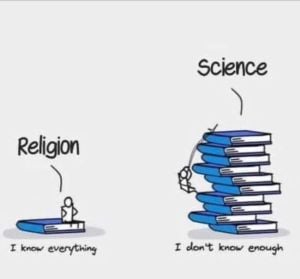
The site formerly known as Twitter brings us another gem of popular atheism:

Of course, there’s something deeply ironic here. The idea that “religion” teaches that if you read one book you “know everything” is a gross caricature. Perhaps this critique captures something true of some shallow forms of religion, but anyone who thinks that this represents all or even most religious people is being too intellectually incurious. Before painting with such a broad brush, they should cultivate an intellectual curiosity, and realize that they “don’t know enough” about what religious people actually believe.
For instance, did the Catholic Church really invent the university system (with the Universities of Bologna, Paris, and Oxford in the 11th century) because they only wanted people to know about one book? By that same reasoning, why does the Vatican run one of the oldest astrological research centers on Earth, the Vatican Observatory? And speaking of astronomy, “Jesuit contributions to astronomy are significant enough that 34 craters on the moon and several asteroids are named after them.” Nor is this scientific interest anything new, or confined to astronomy: the father of genetics was a monk, Gregor Mendel; the fallopian tube is named after the 16th-century anatomist Fr. Gabriele Falloppio; and the Big Bang theory was first proposed by Fr. Georges Lemaître. Additional examples abound. The point is, all of this seems like an awful lot of unnecessary work for people who supposedly think one book is all you need.
Atheists who want to cultivate intellectual curiosity (instead of simply bragging about how curious they already are) might start with this question: why has the Catholic Church in particular been so interested in learning more about science? A good resource here would be Pope John Paul II’s encyclical Fides et Ratio, on faith and reason, in which he declares that:
Faith and reason are like two wings on which the human spirit rises to the contemplation of truth; and God has placed in the human heart a desire to know the truth—in a word, to know himself—so that, by knowing and loving God, men and women may also come to the fullness of truth about themselves.

